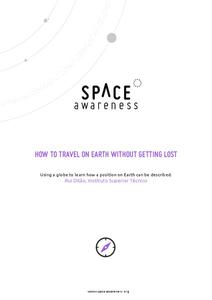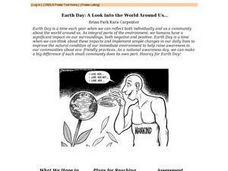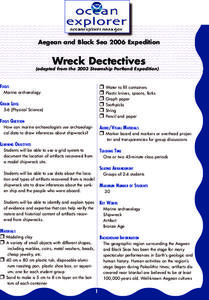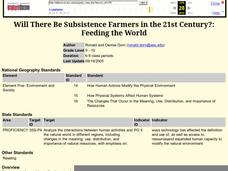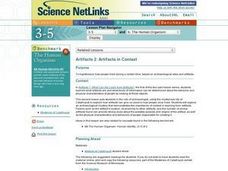Space Awareness
How To Travel On Earth Without Getting Lost
Have you ever wanted to travel the world? Take a virtual trip with a geography lesson that uses longitude and latitude, the position of the sun, an astronomy app, and a classroom globe.
Curated OER
Earth Day: a Look Into the World Around Us
Students develop an artwork made entirely out of recycled materials to exhibit during an Earth Day celebration. They participate in a lecture discussion on the history of Earth Day and environmental issues, do internet research on a...
Global Oneness Project
The Value of Ancient Traditions
Imagine having to give up cell phones, computers, and TV? What would be lost? What gained? An examination of the Drokpa, a nomadic people who live in the grasslands of Tibet, provides class members an opportunity to consider how access...
Ahisma Summer Institute
The Power of One - Math in a Different Angle
In this 2-day lesson focused on exponents, middle schoolers will cross the curriculum by engaging in science, history and language arts activities. Exponential growth will be explored using grains of rice on a chess board. Exponential...
Curated OER
The History of the Theory of Evolution
Students research the history of the theory of evolution and make a comparative timeline of events in world history and in the history of evolutionary theory.
Population Connection
The Peopling of Our Planet
How many people live on the planet, anyway? The first resource in a six-part series covers the topic of the world population. Scholars work in groups to conduct research and make population posters after learning about the global...
American Institute of Physics
African Americans and the Manhattan Project
A lesson about the Manhattan Project will explode young physicists' understanding of the racial attitudes in the United States during and after World war II. Groups select an African American scientist or technician that worked on the...
Population Connection
Where Do We Grow from Here?
Did you know that the population is expected to grow to 11 billion by 2100? The resource serves final installment in a six-part series on the global population and its effects. Scholars interpret data from the United Nations about the...
Space Awareness
Britannia Rule the Waves
Could you determine longitude based on measuring time? Early explorers used a longitude clock to do just that. Scholars learn about early exploration and the importance of the invention of the clock. Then pupils build their own longitude...
American Institute of Physics
Meet Four Pioneering African American Astronauts
An out-of-this-world resource introduces young scientists to four African American astronauts: Michael P. Anderson, Ronald E. McNair, Guion S. Bluford Jr., and Jeanette J. Epps. Groups read biographies of these individuals and prepare...
Curated OER
"ART ZOO 'Blacks in the Westward Movement', 'What Can You Do with a Portrait', and 'Of Beetles, Worms, and Leaves of Grass'"
Students study black history, examine portraits and portrait making and create their own portraits, and investigate their natural environment. This humanities lesson provides a text that can be used to teach lessons in black history,...
Curated OER
The Greatest Show on Earth: The World's Smallest Animals
Students create instruments to capture different types of insects. In this The Greatest Show on Earth: The World's Smallest Animals lesson, students compare the attributes of certain insects and record the data on a chart. After catching...
Curated OER
Celebrating Our Connections Through Water
Students examine the role of water in ceremonies around the world. In this world history instructional activity, students explore how other cultures celebrate water. They create a Water Day for younger students to participate in.
Curated OER
Urban Ecosystems 2: Why are There Cities? A Historical Perspective
Second in a series of five lessons, this lesson encourages preteens to consider cities as urban ecosystems. First, they keep a food diary for a few days. They visit the Natrional Agricultural Statistics Service website for current data...
Curated OER
Wreck Detectives
Junior archaeologists examine types of artifacts from the Bronze Age on the internet. In collaborative groups, they create a story about a ship from this period and then construct a model of the ocean floor after their ship has sunk....
Curated OER
Inventions Change the World: The Enigma Machine
Third graders explore WWII by analyzing technological advances. For this invention lesson, 3rd graders discuss the use of the Enigma machine which decoded private German messages that communicated with U-boats. Students utilize a...
Curated OER
Will There Be Subsistence Farmers in the 21st Century?: Feeding the World
Students examine the topic of subsistence farming. They research the future of subsistence agriculture, identify the types and locations of subsistence agriculture, and write about subsistence farming in regards to developing nations and...
Teach Engineering
Airplanes Everywhere: Land! Water! Sky! Oh, My!
How important is aviation? Using the background information, teachers provide the class with a brief history of aviation. The class discusses how airplanes are important to the area of transportation in the 17th installment of a...
Consortium for Ocean Science Exploration and Engagement (COSEE)
Life in an Ocean World
How does the shell color of crabs and the habitat they live in impact the predator-prey relationship? The fourth activity in a series of five is a game where participants try not to get eaten if they are a prey and try to eat if they are...
NOAA
History's Thermometers
How is sea coral like a thermometer? Part three of a six-part series from NOAA describes how oceanographers can use coral growth to estimate water temperature over time. Life science pupils manipulate data to determine the age of corals...
Curated OER
Ancient Camel History "Cloze" Page
In this ancient camel history worksheet, students complete a cloze activity in which 7 words from a word bank are inserted into a factual text. This is to be used with an information handout that is not included here.
Curated OER
Ancient Mediterranean Lands: Rome
Seventh graders research ancient Roman civilizations, trade routes, aqueducts, and agriculture. In this Ancient Rome lesson, 7th graders view a picture of the Roman Aqueduct Pont du Gard and discuss its use in ancient Rome. Students read...
Curated OER
Dinosaurs 1: Where are the Dinosaurs?
Students investigate world history by creating a diorama in class. In this dinosaur extinction lesson, students read assigned text discussing the time frame of the dinosaurs residence on Earth and their eventual demise. Students recreate...
Curated OER
Artifacts 2: Artifacts in Context
Students explore world history by completing artifact worksheets. For this archaeology lesson, students identify the importance of finding clues when researching historical information by utilizing artifacts. Students research the...
Other popular searches
- World History Worksheets
- World History Projects
- Ancient World History
- World History Lesson Plans
- World History Africa
- Ancient World
- World History by Era
- Genocide in World History
- World History Time Line
- People in World History
- World History Eras
- World History + Chronology


